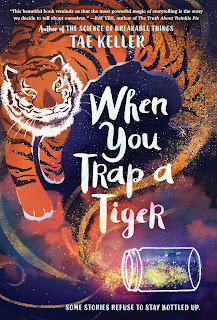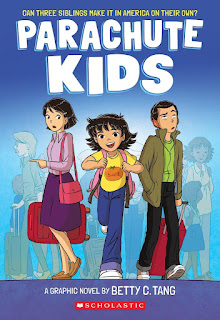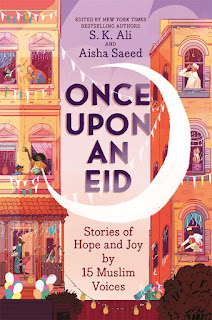#IMWAYR: Northranger!
Update (5/13/2024): I'm looking back at this review and realizing I give way too much plot away in it, so maybe proceed with caution if you haven't read the book yet! (I had so much to say at the time, I couldn't contain myself...)
Hey y'all! I ended up reading two graphic novels this week, but I'm saving the second for next week's post, because the review today is long enough as is.
So enough dawdling—let's dive in!
Young Adult
Northranger
This is one of those books I so desperately want to do justice in my review that I can barely write the review. This is one of those books I read in a single night the day it came out. This is one of those books that I didn't know I needed...and I suspect a lot of people will feel the same way.
(Oh, anaphora...how I love thee for making me sound like I can actually write thoughtfully.)
Sometimes, it seems like LGBTQ+ representation can be divvied up into two categories: the representation that is sweet and hopeful and probably a bit unrealistic, and the representation that is crushing and real and should be consumed in small doses. There's a place for both of these types of stories. You need the peppy protagonists and swirling romances to show young readers that, one day, they will get to live the lives they dream of. And you also need the aggression, the hurt to show young readers that they aren't alone, that they're not the only queer person on the planet who is searching and struggling.
The problem is, so often, this representation is bizarrely split across books. It's two separate stories that authors pick and choose from. But real life doesn't have a giant crack down the middle—it's unified. Queer young people like me try to find hope and soothe their hurt at the same time. So if characters are never navigating that balance, then that's a whole aspect of our existence that isn't represented.
That's what makes Northranger so powerful. It's got the hope and the hurt all at once. Cade and Henry do get to have their own dreamy romantic moments—the ones so many of us wish for. They kiss, and surprise each other with clever dates, and watch horror movies together, and make each other laugh and even smile. Bre Indigo's art brings their love to life so simply, and so beautifully—you pretty much get the butterflies in your stomach watching them looking at each other, because they so clearly love each other on such a deep yet straightforward level. And I don't even think I can adequately explain how much it meant to me to see a blueprint of two boys dating—it isn't the first time, but it felt like the first time I didn't have to awkwardly piece together a relationship schema from other media and make it stick like a weird duct-tape mosaic. It was just like...oh. This is how a relationship could look for me.
So it's beautiful. But also, this book isn't afraid to show the morass of trauma and discrimination and bulls**t that Cade and Henry live within. A couple things stand out to me. One is that this book shows a full spectrum of people's tolerance, from people who are truly and unforgivably bigoted, to people who aren't awful per se but think some well-placed nudges can turn their loved ones straight, and then all the way to people whose love, acceptance, and adoration for our main characters knows no bounds. There's a scene related to that last part that is one of the most beautiful things I've ever read.
Another thing that stands out is less of a plot point, and more of a realization I had while reading. Because I randomly lucked into my loving family, I'm not always able to imagine what it would be like to have parents who aren't accepting. But watching Cade and Henry navigate the deeply imperfect family lives they live in, two metaphors drifted on into my mind. One is that living without a loving family must be like spending your life on the cold satellites that orbit the earth—it doesn't matter how stressful the world around you is if you don't even have a home base to return to, to hide in. And the other metaphor is that living without a loving family must be like when I, as a kid, ran up to my dad and a grocery store and hugged him—and the guy wasn't my dad. When you're looking for a loved one to hug you, or talk to you, or smile at you...there isn't one. There's just a man, like a stranger in your house, unpredictable, unloving, unknowable.
Another thing. The complicated end of the story has to do with Cade's love of horror movies—a love inspired by the protagonist of Jane Austen's Northanger Abbey, on which this book is based. Cade is so used to watching these movies that he starts to view the world as if it is a horror movie—and the story certainly serves up enough eerie details and meta-commentary to ensure you never quite get your bearings on what's going on, until the end. But even beyond one's horror-movie-preferences (not a fan myself) and the unnerving aspects of the story, there's also something subtextually happening here that I think pretty much every queer person can relate to—forgetting how to trust people. As a 7th grader, I taught myself how to shut my excitable mouth and say nothing, lest I inadvertently reveal that I was gay or had OCD. And although I've realized since that many of my classmates likely would have shown me compassion, I've also realized that the school administrators...would not have done the same. People spend their lives in the closet because they're afraid—afraid of what people would think of them, say to them, do to them. But then, when the perfect guy shows up on your doorstep and you finally get to be vulnerable and reveal yourself and be safe—how are you going to believe things are different? That's the challenge in queer relationships, as I learned from this book—deciding whether to trust someone with your whole heart when countless memories and experiences are telling you to save yourself, and keep your guard up.
I do feel the need to remind you that this book is not as sad as I've made it sound—there's something about the simplicity of happiness and the convoluted mess of pain (as well as my own cynical mindset) that makes the discussion of sorrow in this book like 5 times longer than the discussion of joy, when that isn't the actual balance in the story. But I do want to conclude with a few more notes. I need to emphasize how freaking precious Cade and Henry—and also Henri, his identical twin sister—truly are. I literally almost jumped out of my bed with excitement when Cade, listing off some favorite horror movies, mentioned A Girl Walks Home Alone at Night—which I actually saw for a film class last year and can confirm is so good (basically, an Iranian woman goes on a righteous feminist killing spree). And Henry—oh my gosh, Henry. This boy has lived through so much pain, it breaks my heart—I know so many readers will feel seen in his struggles, but oh, how I wish they didn't have to. But he is such a precious bean as well. And Henri pretty much stole my heart the moment she stood on the dining table and confronted her father's misogyny, both hilariously and brilliantly—it was epic, as I'm sure Cade and Henry would confirm as observers. And I'm sure you think this by now, but the art and dialogue and storytelling work so smoothly in this book—this is seriously such a high-quality book, with such deep subtext.
I am going to bring up one extra thing (you know, because what this review desperately needed was more length), since it has lingered with me throughout the week. There's a point in the story where Henry opens up to Cade about a really deep kind of pain that—as far as I can tell—Cade has never felt. It's not the kind of thing where the pain is urgent and explosive, but it's definitely the kind of thing where the pain is still raw and weeping, even after all this time. And Cade, who is such a wonderful human and is totally the boyfriend that Henry deserves, feels this pain and tries to comfort Henry. But the thing is, I question the exact way he goes about it. He tries to relate to Henry, to help him realize he isn't alone in his pain, that so many other people are going through those feelings too. But...they're not. We can summarize feelings with umbrella terms like "anger" or "hope," but no two people feel the exact same thing. No two people have the same waves of feeling, the rising and falling—or the persistence, or intensity, or connected memories, or supposed conclusions. And I think—based on my intense romantic wistfulness that prompted me to buy this book in the first place—that often, when we look for a romantic partner, we're trying to practically become someone else, to shove our way into their minds (or bring them into ours) so we can feel less alone. But no matter how close we are physically, or how much we free-associate in the passenger seat as they drive under the moonlight, neither of us will ever know what the other is feeling. And neither of us can save the other. The analogy that came to mind is that we can be the cheerleader, and serve the Gatorade, but we can't jump into the uniform and play the football game—only they can do that, because it's their football game. And so I guess what I'm saying is, without blaming Cade at all because he's literally sixteen and it's his first relationship, I do wonder what it would be like for Cade, rather than to think he's felt exactly the pain Henry's felt, to instead recognize that he's never felt the pain Henry's felt, and he never will. And I wonder what it would be like for him to say to Henry something like, "I wish I could go into your head and be there for you in those moments, because that must feel so isolating. And I can't, but I promise you, I wish I could, and I'd do it in a heartbeat."
Stepping down from my soapbox, I think it's evidence of how powerful this story is that my brain's been mulling it over all week, subconsciously and consciously. And more importantly, this book helped me find my way into myself. Northranger made me realize that I get to decide—right here, and right now—that I want the joy Cade and Henry have. I want it, and I don't care what metaphorical voices in my head are reminding me it's perverted, or impossible, or burdensome to others, or so challenging I might as well give up. I can't snap my fingers and find the partner of my dreams, but I can decide what I dream, and I can decide what I do when those dreams come true—like choosing to trust my partner no matter how afraid I am, or working to understand their feelings while recognizing the limits. This book prepped me, patted me on the shoulders, and sent me out into the world, armed and ready—so now I can find my own Cade, or my Henry.
Ultimately, this is a book for people like me. Which is to say, of course, it's a book for everyone.




Glad you enjoyed Northranger so much. It must have been good for you to read it in one day.
ReplyDeleteThanks, Natalie! It was definitely nice to read it in a single day—I feel like the anticipation of the rest of the story alone would have been ruinous! I appreciate you stopping by!
DeleteYou are so right that we need books that aren't so one sided. I do wonder about any YA or MG book structured after Austen's work, or Shakespeare, etc. Maybe high school students enjoy that, but middle schoolers aren't even aware of them. Do you think this is too much for middle school? YA and MG romances are so different. I thought The Language of Seabirds was a really solid MG entry that had the balance that you mention. YA books are more angsty is a whiny and drawn out way that tweens don't enjoy. May have to take a look at this, since you liked it so much!
ReplyDeleteI think what worked for me about the Austen-ness of this book is that you can completely ignore it—I'd say it inspires the flow of the plot and some elements, but not in a way to where knowing that backstory would add to one's understanding of the story. I personally wasn't drawn to that aspect, and I probably wouldn't even mention it if I was recommending this to a friend!
DeleteAbout your middle-school question, I think this book is pretty unflinching about the challenges of queer life, and my initial instinct was to say it's too much for MG readers. That said, it's not like there aren't LGBTQ+ middle schoolers dealing with those very same challenges!
And I'll have to look at The Language of Seabirds—I've never seen it before, so thanks for bringing it to my attention! I've personally been feeling the YA angst myself, but the longer we can preserve tweens' optimism, the better! 😅
Thanks so much for your thoughtful comment, Karen!
Wow this one sounds so good! I haven't read a good graphic novel in while so maybe this is one I should get from my local library.
ReplyDeleteThe fun thing for me about reading so many graphic novels right now is that I can just throw them all at the wall and see which ones stick for each reader—I hope this one sticks for you, Helen!
DeleteThis sounds like a beautiful and well-written book. From reading how this book impacted you it sounds like there are many young adults who are going to benefit from reading it.
ReplyDeleteIt really is, and I think you're right that so many young adults will benefit from this story, myself included! Thank you so much for stopping by, Lisa!
DeleteHappy Pride Month to you too, Max!
ReplyDeleteI know what you mean by 'positive message' and 'all the pain' queer books. Yes, both parts of life need to be portrayed, just as we need to be able to take care of ourselves AND trust our partners (even when when they disappoint us), all while ignoring the internalized homophobia that tells us we do not deserve happiness and are not strong enough to work through the challenges in our relationships. (Hmmm. That's a bit of a run-on sentence.)
The challenge of queer relationships is that we navigate all of this simultaneously. (Thanks a lot, homophobic society!)
Thanks a lot Max, not only for your review but for sharing your questions and insights. That guy of yours - whoever he turns out to be - will be one very lucky man.
I'm so glad you stopped by this week, Linda!
DeleteThat summary is so powerful and so accurate. You're so right that we have to take care of ourselves too and listen to our observations of a situation, rather than blindly forcing ourselves to trust when it isn't earned. And I'm struck by what you said about the strength to work through relationship challenges—I can totally see how being deemed "sensitive" or "other" or "outcast" would make one feel as though they didn't have the courage or bravery to face those obstacles. When in fact, people living despite those labels are pushing through challenges every day!
It's definitely a lot to juggle all at once, and I am certain your story has all of those complicated layers too—and I appreciate stories like this for giving us space to talk about all that complexity at once, rather than focusing on just "this" or "that."
And I appreciate your kind words at the end so much. You were on my mind when I posted this, and I'm grateful to hear from you!
Your review has intrigued me. I'm off to seek this book now
ReplyDeleteVery cool—I hope you enjoy the book, Earl, and thanks so much for stopping by!
DeleteI'm a big Jane Austen fan, and a big Rex Ogle fan, and now I need this book. A great review!
ReplyDeleteWell, how perfect is that! I hope you enjoy the book, Beth, and thanks so much for stopping by!
Delete